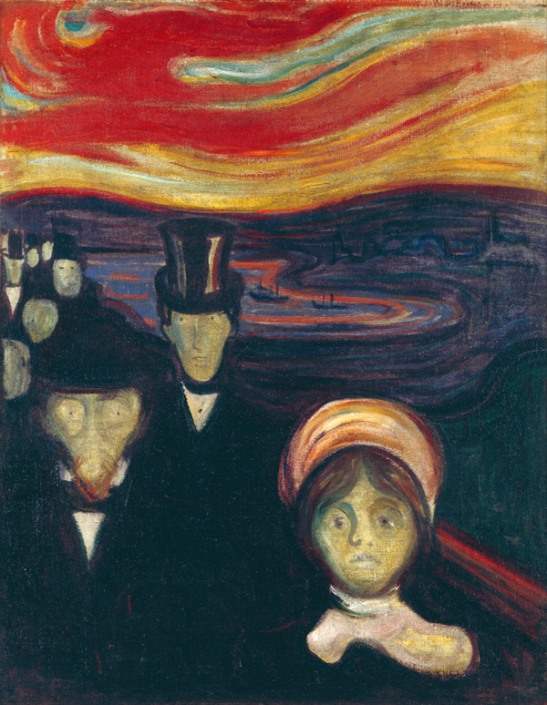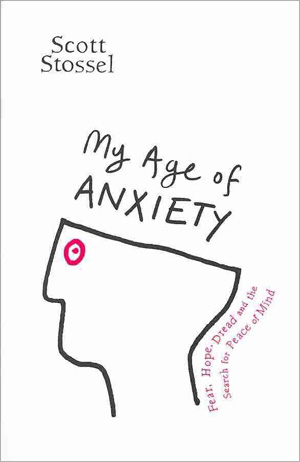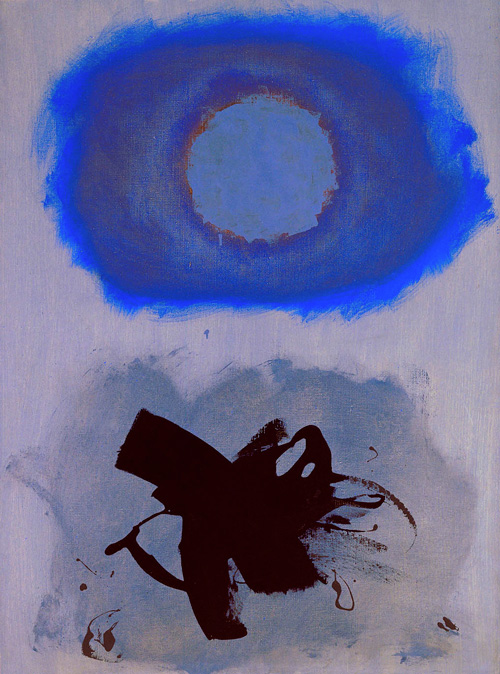The Age of Anxiety
There is no word in the Dutch language for ‘anxiety’. There are words that come close, like ‘worried’, ‘concerned’, ‘fearful’ or ‘scared’, but none of them come close to the dreadful experience of actual, real anxiety. Does that mean that Dutch people know no anxiety? Or is there maybe something in the English language itself that can cause more people to suffer from anxiety than speakers of other languages that don’t have a word for it, like the Dutch? As a person who speaks and writes in both languages equally as much, and as a person who is all too familiar with anxiety, the answer to the above questions would be more surprising than you think.
The experience of an anxiety disorder, and in particular of having a panic attack is slightly, only slightly comparable to having just had 20 cups of strong coffee all at once, facing a huge crowd while needing desperately to go to the toilet, which is occupied by a giant lion, while actually just having a quite meal in a restaurant. That anxious thought creates even more anxiety, and so on.
Recently I have read ‘My Age of Anxiety: Fear, Hope, Dread, and the Search for Peace of Mind’ by Scott Stossel, a writer for the Atlantic, and I can think of no one who can not only precisely describe better what anxiety means in such a thorough way, but also in such an extremely funny and liberating way. Here is a highlight from his book on his painful but extremely hilarious Mr. Bean-like experience at the Kennedy’s residence:
When your stomach governs your existence, it’s hard not to be preoccupied with it. A few searing experiences—soiling yourself on an airplane, say, or on a date (and yes, I have done both)—will focus you passionately on your gastrointestinal tract. You need to devote effort to planning around it—because it will not plan around you.
Case in point: In the summer of 1997, while researching my first book, a biography of Sargent Shriver—who founded the Peace Corps for his brother-in-law John F. Kennedy—I spent part of the summer living with the extended Kennedy family on Cape Cod. One weekend, then-President Bill Clinton, who was vacationing on Martha’s Vineyard, went sailing with Ted Kennedy, and I suspected that Hyannis Port, Massachusetts, where the Kennedys have their vacation homes, would be crawling with Secret Service agents. With some time to kill before dinner, I decided to walk around town to take in the scene.
Bad idea. As is so often the case for people with unruly, nervous bellies, it was at precisely the moment I passed beyond Easily-Accessible-Bathroom Range that my plumbing came unglued. While sprinting back to the house where I was staying, I was several times convinced I would not make it and—teeth gritted, sweating voluminously—was reduced to evaluating various bushes and storage sheds along the way for their potential as ersatz outhouses. Imagining what might ensue if a Secret Service agent were to happen upon me crouched in the shrubbery lent a kind of panicked, otherworldly strength to my efforts at self-possession.
As I approached the entrance, I was simultaneously reviewing the floor plan in my head (Which of the many bathrooms in the mansion is closest to the front door?) and praying that I wouldn’t be fatally waylaid by a stray Kennedy or celebrity (as I recall, Arnold Schwarzenegger, Liza Minnelli, and the secretary of the Navy, among others, were visiting that weekend).
Fortunately, I made it into the house unaccosted. Then a quick calculation: Can I make it all the way upstairs and down the hall to my suite in time? Or should I duck into the bathroom in the front hall? Hearing footsteps above and fearing a protracted encounter, I opted for the latter and slipped into the bathroom, which was separated from the front hall by an anteroom and two separate doors. I scampered through the anteroom and flung myself onto the toilet.
My relief was extravagant and almost metaphysical.
But then I flushed and … something happened. My feet were getting wet. I looked down and saw to my horror that water was flowing out from the base of the toilet. Something seemed to have exploded. The floor—along with my shoes and pants—was covered in sewage. The water level was rising.
Could the flooding be stopped? Turning around, I removed the porcelain top of the toilet tank, scattering the flowers and potpourri that sat atop it, and frantically began fiddling with its innards. I tried things blindly, raising this and lowering that, jiggling this and wiggling that, fishing around in the water for something that might stem the swelling tide.
Somehow, whether of its own accord or as a result of my haphazard fiddling, the flooding slowed and then stopped. I surveyed the scene. My clothes were drenched and soiled. So was the bathroom rug. Without thinking, I slipped off my pants and boxer shorts, wrapped them in the waterlogged rug, and jammed the whole mess into the wastebasket, which I stashed in the cupboard under the sink. Have to deal with this later, I thought to myself.
It was at this unpropitious moment that the dinner bell rang, signaling that it was time to muster for cocktails in the living room.
Which was right across the hall from the bathroom.
Where I was standing ankle-deep in sewage.
I pulled some towels off the wall and dropped them on the ground to start sopping up some of the toilet water. I got down on my hands and knees and, unraveling the whole roll of toilet paper, began dabbing frenziedly at the water around me. It was like trying to dry a lake with a kitchen sponge.
What I was feeling at that point was not, strictly speaking, anxiety; rather, it was a resigned sense that the jig was up, that my humiliation would be complete and total. I’d soiled myself, destroyed the estate’s septic system, and might soon be standing half naked before God knows how many members of the political and Hollywood elite.
In the distance, voices were moving closer. It occurred to me that I had two choices. I could hunker down in the bathroom, hiding and waiting out the cocktail party and dinner—at the risk of having to fend off anyone who might start knocking on the door—and use the time to try to clean up the wreckage before slipping up to my bedroom after everyone had gone to bed. Or I could try to make a break for it.
I took all the soiled towels and toilet paper and shoved them into the cupboard, then set about preparing my escape. I retrieved the least soiled towel (which was nonetheless dirty and sodden) and wrapped it gingerly around my waist. I crept to the door and listened for voices and footsteps, trying to gauge distance and speed of approach. Knowing I had scarcely any time before everyone converged on the center of the house, I slipped out of the bathroom and through the anteroom, sprint-walked across the hallway, and darted up the stairs. I hit the landing, made a hairpin turn, and headed up the next flight to the second floor—where I nearly ran headlong into John F. Kennedy Jr. and another man.
“Hi, Scott,” Kennedy said. (I’d just met him for the first time the day before. “I’m John Kennedy,” he had said when he extended his hand in introduction. I know, I had thought as I extended mine, thinking it funny that he had to pretend courteously that people might not know his name, despite the ubiquity of his face on the cover of checkout-counter magazines.)
“Uh, hi,” I said, racking my brain for a plausible explanation for why I might be running through the house at cocktail hour with no pants on, drenched in sweat, swaddled in a soiled and reeking towel. But he and his friend appeared utterly unfazed—as though half-naked houseguests covered in their own excrement were common here—and walked past me down the stairs.
I scrambled down the hallway to my room, where I showered vigorously, changed, and tried to compose myself as best I could—which was not easy because I was still sweating terribly, right through my blazer, the result of anxiety, exertion, and summer humidity.
There are many reasons to point out to what causes anxiety. There might be deep personal obstacles that haven’t reached the consciousness yet, but find their way out triggered by seemingly completely unrelated stimuli, like train journeys, crowds, confined spaces or just regular people next you in the office. There are many ways in battling these, most notably psychotherapy. The best, it seems, is to dig deep and try and find the root cause and confront that some way or another.
Stossel goes in great lengths not just to find out what might have caused anxiety in his case and in people in general (with looking at other famous examples, most notably nobody less then Charles Darwin and his constant farting and barfing), both by looking at it mentally and physically, at nature and/or nurture, history, family, medication and drugs. Almost half of his book is on medication, which I think might be a typical American problem; to think that a pill, anything, will ‘fix’ such a fundamental and existential state of being is an entire problem on to its own.
Another method to battle anxiety, one I felt missed in Stossel’s book, is to focus on consciousness and the ego. The visible gaps left behind in the stressful and overly rational western way of thinking are at least in part being filled by Eastern influences, focussing primarily on the different states of awareness and just being; an approach some would call more ‘spiritual’ than scientific – or at least more imaginative. As many of the ‘alternative’ approaches to health and well-being are frowned upon in the western world – often rightly so – it is well worth looking into these, even if it is for experiment’ s sake – a core ‘value’ in science.
There is a lot that can be said about this but it requires will and imagination to go there. So then, back to you, dear reader.






 David Enker
David Enker
 David Enker
David Enker
